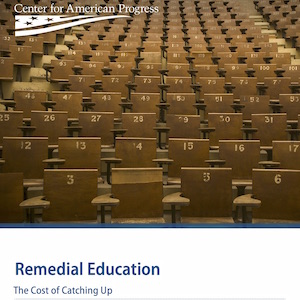 A new report from the Center for American Progress details the state of remedial education at colleges and universities across the United States. The authors’ analysis found that remedial courses cost students and their families more than $1.3 billion annually for instruction that should have been completed in high school.
A new report from the Center for American Progress details the state of remedial education at colleges and universities across the United States. The authors’ analysis found that remedial courses cost students and their families more than $1.3 billion annually for instruction that should have been completed in high school.
A significant percentage of the students who have to take these remedial education classes are African Americans. The report says that 56 percent of all African American college students enroll in some type of remedial education course compared to 35 percent of White students. These figures are backed up by recent data from the American College Testing Program, reported in JBHE, that show that 34 percent of Whites who took the ACT test were deemed college ready in all four areas of English, mathematics, reading, and science. For Blacks, only 6 percent of all test takers were deemed college ready in all four areas.
The data also shows that students who are obliged to take remedial education tend to not do well in college and often drop out of school. The authors state that “remedial education is systemic black hole from which students are unlikely to emerge.”
The report concludes by saying that “unfortunately, too many students head to college underprepared for the rigor of college coursework. Once in college, students can ill afford the additional time and resources demanded by the remedial courses required to complete their degrees, and as a result, too many of the most vulnerable students drop out. While there currently is a need for remedial classes, states, higher education institutions, and K-12 education systems must do more to successfully prepare students to complete college and eliminate that need altogether. Higher standards and collaborative efforts across higher education and K-12 education are essential steps in creating a stronger education system for all students.”
The full report, Remedial Education: The Cost of Catching Up, may be downloaded by clicking here.











I will admit that this study is accurate, but there are a few students who overcome this hurdle and persist on to graduate. Students taking remedial education have become an increasing problem in higher education. Community colleges are better equiped at handling this problem than 4 year institutions. There should be an uproar as to the kind of job that K-12 is doing to better equip students for college, because tax payers and parents are paying double for what students should have learned pre-college.
Perhaps K-12 should become K-13. The 13th grade could be where college bound students could catch-up with intense refresher courses.
13th year is a great idea. There are things that many Freshmen in college are lacking.